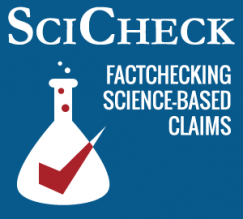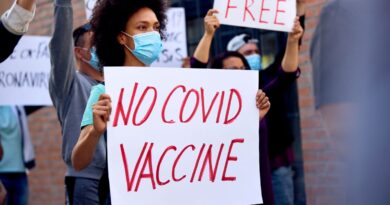Blood Transfusion Doesn’t Transfer COVID-19 Vaccine
SciCheck Digest
A blood transfusion from a vaccinated person doesn’t transfer the inoculation to an unvaccinated person. But high-profile purveyors of misinformation have been promoting the long-standing false claim that it does.

Most people in the U.S. — about 80% — have gotten at least one dose of a COVID-19 vaccine, and they’ve been able to donate blood since the vaccines first became available, according to guidance from the Food and Drug Administration.

So it’s been almost two full years that blood from vaccinated donors has been used for transfusions, Dr. Roy Silverstein, chair of medicine at the Medical College of Wisconsin, Division of Hematology and Oncology, told us in a phone interview. “We’ve seen no evidence of any kind of safety concern,” he said.
But anti-vaccine campaigners have recently focused on a claim that’s been lingering since the vaccines first became available — the unfounded idea that those who have not been vaccinated against COVID-19 have “clean blood” or “pure blood” and that it’s dangerous for them to receive a transfusion from someone who is vaccinated. The term “pure blood” has been embraced by at least one member of Congress, Rep. Marjorie Taylor Greene, who has a history of spreading vaccine misinformation.
This theory has recently become a cause célèbre among major conspiracy theorists — including Alex Jones, David Icke and Stew Peters — since a couple in New Zealand has sought to delay heart surgery for their infant until the hospital agrees to use blood from an unvaccinated donor during the operation. A New Zealand court has now granted a temporary medical guardianship for the baby so that he can undergo the procedure.
One post on Substack that’s a mash-up of two notorious purveyors of COVID-19 misinformation — Steve Kirsch and Dr. Ryan Cole — claims that because of COVID-19 vaccination, “The safety of the blood supply is unknown.”
But Silverstein called the claim “patently false.”
Doctors and organizations such as the Association for the Advancement of Blood & Biotherapies have been explaining for more than a year that concerns about blood from vaccinated individuals are unfounded. The AABB actually issued guidance to help doctors answer patient questions on the issue.
Posts like the one from Kirsch and Cole — each of whom are associated with organizations that promote false claims about vaccination and collect monetary donations — are pandering to those who don’t want to believe science, Silverstein said.
“People are trying to make money out of bad science, which is really disturbing to me,” he said, because it undermines the whole system.
Blood used for transfusions in the U.S. is regulated by the FDA, which requires each unit of donated blood to be tested for infectious disease and requires donors to be screened.
The vaccines that are available in the U.S. would not pose any risk of infecting either the recipient of the vaccine with the virus that causes COVID-19 or anyone who might receive a blood transfusion from that person, since none of the available vaccines use a live attenuated virus. Rather, they use just a small part of the virus — or provide instructions for cells to make such a fragment — to instruct the immune system on how to recognize it and fight infection.
The most common type of COVID-19 vaccine used in the U.S. is an mRNA vaccine — the m stands for messenger — which is injected into the muscle. Cells read the RNA “instructions” to produce coronavirus spike proteins, which prompt the immune system to respond, including the production of protective antibodies.
“There’s nothing that happens when you get vaccinated that doesn’t also happen when you get infected,” E. John Wherry, chair of the department of systems pharmacology and translational therapeutics and director of the University of Pennsylvania’s Institute for Immunology at the Perelman School of Medicine, told us in a phone interview.
The immune response to the vaccine is really a subset of what your immune response following infection would be, he said, concluding, “There’s nothing really qualitatively different.”
The only real difference is that the vaccine causes a response targeted at the unique spike protein of the virus that causes COVID-19, whereas someone who had been infected would also produce antibodies that recognize other parts of the virus.
The mRNA doesn’t last long after it’s done its job triggering an immune response, Wherry said.
“We don’t see the mRNA sticking around, that’s for sure,” he said.
Within days of vaccination, Silverstein said, “there’s no trace of any of the mRNA in the blood.”
“If an unvaccinated person gets a blood transfusion from a vaccinated donor, the unvaccinated person does not become vaccinated,” Malia Jones, a public health researcher, explained in a post in March.
“A vaccine contains extremely small amounts of both active & inactive ingredients which never enter our bloodstream in the same way as other medications like pain relievers, antibiotics, or antidepressants,” she wrote. “All the action comes from your own immune system.”
So there’s no cause for concern about getting a blood transfusion from a vaccinated donor. As Silverstein pointed out, blood from vaccinated donors has been in the supply for almost two years with no health issues.
But, as was noted early on by doctors who encountered hesitation from patients who didn’t want a transfusion from a vaccinated donor, much of the concern is based on now-entrenched beliefs in misinformation about vaccines.
Purveyors of misinformation also continue to build on previous claims. For example, the post from Kirsch and Cole that claims the blood supply may be unsafe references the baseless claim that vaccines are causing unusual blood clots that are killing swaths of people. Both Kirsch and Cole were featured in a viral video posted in November called “Died Suddenly” that pushed that claim, which we’ve explained has no merit.
Editor’s note: SciCheck’s COVID-19/Vaccination Project is made possible by a grant from the Robert Wood Johnson Foundation. The foundation has no control over FactCheck.org’s editorial decisions, and the views expressed in our articles do not necessarily reflect the views of the foundation. The goal of the project is to increase exposure to accurate information about COVID-19 and vaccines, while decreasing the impact of misinformation.
Sources
U.S. Food and Drug Administration. “Updated Information for Blood Establishments Regarding the COVID-19 Pandemic and Blood Donation.” 19 Jan 2021.
Silverstein, Roy. Chair of medicine, Medical College of Wisconsin, Division of Hematology and Oncology. Telephone interview with FactCheck.org. 7 Dec 2022.
Aleccia, JoNel. “‘Tainted’ Blood: Covid Skeptics Request Blood Transfusions From Unvaccinated Donors.” Kaiser Family Foundation. 17 Aug 2021.
Corlett, Eva. “Parents refuse use of vaccinated blood in life-saving surgery on baby.” The Guardian. 30 Nov 2022.
Jacobs, Jeremy, et al. “Refusing blood transfusions from COVID‐19‐vaccinated donors: are we repeating history?” British Journal of Haematology. 15 Sep 2021.
Association for the Advancement of Blood & Biotherapies. “Vaccination and blood donation.” AABB.org. Accessed 12 Dec 2022.
U.S. Food and Drug Administration. “Keeping Blood Transfusions Safe: FDA’s Multi-layered Protections for Donated Blood.” Updated 23 Mar 2018.
Centers for Disease Control and Prevention. COVID-19 Vaccinations in the United States. Accessed 9 Dec 2022.
Wherry, E. John. Chair, department of systems pharmacology and translational therapeutics and director of the University of Pennsylvania’s Institute for Immunology at the Perelman School of Medicine. Telephone interview with FactCheck.org. 12 Dec 2022.
Jones, Malia. “If an unvaccinated person gets blood from a vaccinated person, will the vaccine transfer?” Dearpandemic.org. 29 Mar 2022.
Hale Spencer, Saranac, Jessica McDonald and Catalina Jaramillo. “‘Died Suddenly’ Pushes Bogus Depopulation Theory.” FactCheck.org. 1 Dec 2022.


